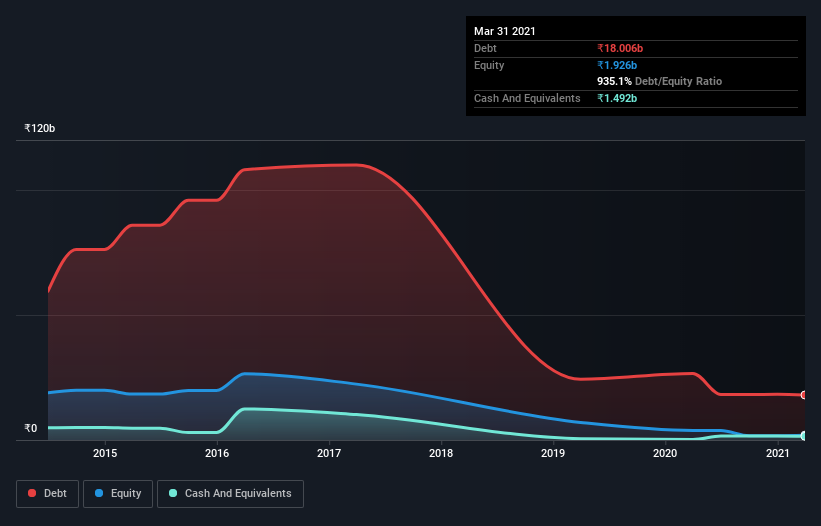
Warren Buffett famously said, 'Volatility is far from synonymous with risk.' So it might be obvious that you need to consider debt, when you think about how risky any given stock is, because too much debt can sink a company. We note that JBF Industries Limited (NSE:JBFIND) does have debt on its balance sheet. But the more important question is: how much risk is that debt creating?
Why Does Debt Bring Risk?
Debt assists a business until the business has trouble paying it off, either with new capital or with free cash flow. Ultimately, if the company can't fulfill its legal obligations to repay debt, shareholders could walk away with nothing. However, a more frequent (but still costly) occurrence is where a company must issue shares at bargain-basement prices, permanently diluting shareholders, just to shore up its balance sheet. By replacing dilution, though, debt can be an extremely good tool for businesses that need capital to invest in growth at high rates of return. The first thing to do when considering how much debt a business uses is to look at its cash and debt together.
View our latest analysis for JBF Industries
How Much Debt Does JBF Industries Carry?
The image below, which you can click on for greater detail, shows that JBF Industries had debt of ₹17.9b at the end of March 2021, a reduction from ₹26.6b over a year. However, it does have ₹1.49b in cash offsetting this, leading to net debt of about ₹16.4b.

A Look At JBF Industries' Liabilities
Zooming in on the latest balance sheet data, we can see that JBF Industries had liabilities of ₹33.5b due within 12 months and liabilities of ₹237.1m due beyond that. Offsetting these obligations, it had cash of ₹1.49b as well as receivables valued at ₹11.0b due within 12 months. So it has liabilities totalling ₹21.3b more than its cash and near-term receivables, combined.
The deficiency here weighs heavily on the ₹2.01b company itself, as if a child were struggling under the weight of an enormous back-pack full of books, his sports gear, and a trumpet. So we definitely think shareholders need to watch this one closely. After all, JBF Industries would likely require a major re-capitalisation if it had to pay its creditors today.
We use two main ratios to inform us about debt levels relative to earnings. The first is net debt divided by earnings before interest, tax, depreciation, and amortization (EBITDA), while the second is how many times its earnings before interest and tax (EBIT) covers its interest expense (or its interest cover, for short). Thus we consider debt relative to earnings both with and without depreciation and amortization expenses.
JBF Industries shareholders face the double whammy of a high net debt to EBITDA ratio (11.4), and fairly weak interest coverage, since EBIT is just 0.23 times the interest expense. The debt burden here is substantial. One redeeming factor for JBF Industries is that it turned last year's EBIT loss into a gain of ₹559m, over the last twelve months. When analysing debt levels, the balance sheet is the obvious place to start. But it is JBF Industries's earnings that will influence how the balance sheet holds up in the future. So if you're keen to discover more about its earnings, it might be worth checking out this graph of its long term earnings trend.
Finally, a company can only pay off debt with cold hard cash, not accounting profits. So it is important to check how much of its earnings before interest and tax (EBIT) converts to actual free cash flow. Happily for any shareholders, JBF Industries actually produced more free cash flow than EBIT over the last year. That sort of strong cash generation warms our hearts like a puppy in a bumblebee suit.
Our View
To be frank both JBF Industries's interest cover and its track record of staying on top of its total liabilities make us rather uncomfortable with its debt levels. But at least it's pretty decent at converting EBIT to free cash flow; that's encouraging. Overall, it seems to us that JBF Industries's balance sheet is really quite a risk to the business. For this reason we're pretty cautious about the stock, and we think shareholders should keep a close eye on its liquidity. There's no doubt that we learn most about debt from the balance sheet. But ultimately, every company can contain risks that exist outside of the balance sheet. Case in point: We've spotted 3 warning signs for JBF Industries you should be aware of, and 1 of them is a bit unpleasant.
If, after all that, you're more interested in a fast growing company with a rock-solid balance sheet, then check out our list of net cash growth stocks without delay.
When trading JBF Industries or any other investment, use the platform considered by many to be the Professional's Gateway to the Worlds Market, Interactive Brokers. You get the lowest-cost* trading on stocks, options, futures, forex, bonds and funds worldwide from a single integrated account. Promoted
New: Manage All Your Stock Portfolios in One Place
We've created the ultimate portfolio companion for stock investors, and it's free.
• Connect an unlimited number of Portfolios and see your total in one currency
• Be alerted to new Warning Signs or Risks via email or mobile
• Track the Fair Value of your stocks
This article by Simply Wall St is general in nature. It does not constitute a recommendation to buy or sell any stock, and does not take account of your objectives, or your financial situation. We aim to bring you long-term focused analysis driven by fundamental data. Note that our analysis may not factor in the latest price-sensitive company announcements or qualitative material. Simply Wall St has no position in any stocks mentioned.
*Interactive Brokers Rated Lowest Cost Broker by StockBrokers.com Annual Online Review 2020
Have feedback on this article? Concerned about the content? Get in touch with us directly. Alternatively, email editorial-team (at) simplywallst.com.
About NSEI:JBFIND
JBF Industries
JBF Industries Limited, together with its subsidiaries, engages in the manufacture and sale of polyester chips, and polyester and processed yarns in India and internationally.
Fair value with imperfect balance sheet.
Similar Companies
Market Insights
Community Narratives




